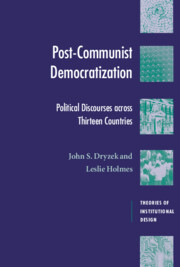3 - China
Published online by Cambridge University Press: 22 September 2009
Summary
China began the twentieth century as a monarchy and an empire, and ended it as a communist state. Communist control over the whole of mainland China was secured in 1949 with the defeat of the Nationalists and their retreat to Taiwan. This was the culmination of several decades of revolution, war, and unstable political arrangements from 1911 on. Though China became a republic, and formally committed to democracy under the nationalists by the 1920s, this commitment remained largely an abstraction. With the Japanese invasion in 1937, the communists and nationalists joined forces. But the relationship was under constant strain and, following the end of the Second World War, they resumed open fighting with each other.
The communist struggle had begun in the early 1920s; after failed attempts to base a revolution in the cities, the Chinese Communist Party (CCP) guided by Mao Zedong developed a strategy of revolution rooted in organization of the peasantry, applied from 1927 on. This kind of protracted struggle based in the countryside was very different from the Leninist model of a seizure of power in the main cities. Not only did the Chinese communists come to power based almost entirely on their own efforts, with very limited outside support, but they also developed their own model of revolution. This lends the CCP regime a degree of legitimacy shared only by Yugoslavia and Russia in this study.
The decades after 1949 were also tumultuous.
- Type
- Chapter
- Information
- Post-Communist DemocratizationPolitical Discourses Across Thirteen Countries, pp. 33 - 56Publisher: Cambridge University PressPrint publication year: 2002



